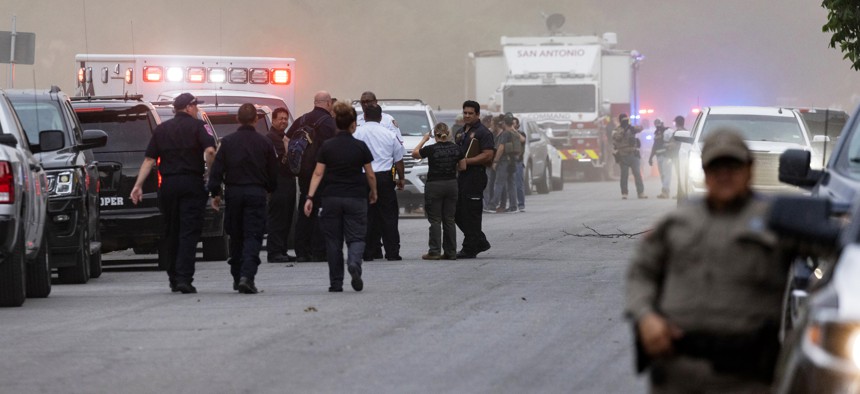
Law enforcement work the scene after a mass shooting at Robb Elementary School in Uvalde, Texas, where 19 students and two teachers were killed. Jordan Vonderhaar/Getty Images
Report: Half of the Responders in Uvalde Were Feds but That Didn't Speed Up the Slow Response
A comprehensive examination of the incident finds law enforcement prioritized their own safety over the 21 shooting victims.
Nearly 200 federal law enforcement personnel responded on the scene during the May shooting at Robb Elementary School in Uvalde, Texas, but they failed to follow proper protocols and contributed to the now-infamous extended delays in taking down the shooter.
Of the 376 officers on the scene in response to the shooting, 184 were federal personnel, including 149 Border Patrol agents. Shortly after its arrival, according to a report from an interim committee in the Texas House of Representatives stood up to investigate the incident, a Border Patrol tactical team known as BORTAC became the “de facto” incident commanders in the school. While that team ultimately made the decision to enter the classroom that contained the shooter and kill him, the report faulted the agents and other law enforcement for failing to act more quickly. Other agencies with employees at the school included the U.S. Marshals Service, Drug Enforcement Administration and additional parts of the Homeland Security Department. Some of the Border Patrol agents were off duty or not in uniform.
The Border Patrol team failed to communicate with local officers, keeping them out of the loop on at least some of their movements and decision making. The agents spent time retrieving a crowbar-type device to force the classroom door open, before deciding it would not work, and searching for a master key for the school. The report concluded the door to the classroom was likely unlocked, but no one ever tried to open it. While the Border Patrol team was on the scene for less time than the state and local police, the report found that, taken as a whole, the law enforcement responders "failed to adhere to their active shooter training" and that they "failed to prioritize saving the lives of innocent victims over their own safety."
The report faulted local police for wasting time waiting for a shield rated for protection against rifles even after the U.S. Marshals Service had already furnished one. The committee said it received no evidence that anyone from USMS alerted the local chief that it had delivered the shield. The BORTAC team ultimately used the shield when it entered the classroom and killed the shooter. It marked the first time anyone had attempted to open the classroom door, which occurred 73 minutes after the first officers arrived on the scene.
Nearly every witness with which the committee spoke described a scene riddled with chaos, with no individual or entity taking control.
The chief of the Uvalde School District police, Pete Arredondo, “did not actually exercise tactical incident command over the BORTAC team, nor did the BORTAC team seek instruction from Chief Arredondo,” the report found.
The committee suggested law enforcement erred in not attempting to call the school’s principal to locate a master key. It also noted none of the Border Patrol personnel on the scene had activated body cameras and if they had it “might have shed additional light” on the situation. CBP noted after the report's release that its agents also helped evacuate students and teachers, provide medical triage, secure the perimeter and support family reunification efforts.
The committee stressed there were no "villains" besides the shooter and there was no evidence of "malice or ill motives." Instead, it concluded, there were "systemic failures and egregiously poor decision making." It also noted most of the victims likely died immediately after the attacker’s initial barrage of gunshots upon entering the school, but law enforcement’s delay could have cost additional lives as some victims died on their way to the hospital.
A spokesperson for CBP said the agency is conducting its own investigation within its Office of Professional Responsibility, which has yet to release any findings.
"We are committed to identifying any improvements to training or tactics that could applied to future incidents," CBP said. "CBP will continue to work with our federal, state, and local partners to answer the difficult questions on what went wrong and how we can improve our responses. We owe this to the Uvalde community, and the nation."
Under federal regulations, Customs and Border Protection, Border Patrol’s parent agency, can operate within 100 miles of the border without special permission. As the largest law enforcement agency in the country with its 60,000 employees, it can often offer resources that local entities cannot or are too overwhelmed to provide themselves. CBP maintains a station in Uvalde, responsible for 3,000 square miles in the area. It has a permanent checkpoint in the town for automotive traffic, and also assists with train and freight operations.
Border Patrol agents in the area responded to a general call for law enforcement assistance.
This story has been updated with additional information from CBP.







